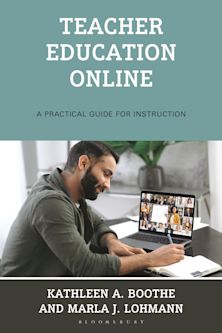- Home
- ACADEMIC
- Education
- Teacher Education
- Coaching Innovations
Coaching Innovations
Providing Instructional Support Anywhere, Anytime
Coaching Innovations
Providing Instructional Support Anywhere, Anytime
You must sign in to add this item to your wishlist. Please sign in or create an account
Description
This book offers alternative and innovative methods to improve preservice and inservice teacher education. The book explores options in preservice education for supervisor coaching of interns completed through both traditional face-to-face and virtual formats. Additionally, professional development strategies for inservice teachers using face-to-face and virtual coaching are discussed with the goal of improving teachers’ classroom content and pedagogy, enhancing teachers’ ability to engage diverse student populations, and supporting teachers’ in innovative classroom technology applications.The book discusses the benefit of using coaching with both preservice and inservice teachers thus shifting the focus of work with teachers from evaluation to increased support in the classroom. Notably, the book explores an innovative model for this work using virtual coaching to provide teacher candidates and practicing teachers much-needed support embedded within their unique classroom context. This model uses Bluetooth Bug-in-the Ear (BIE) devices with Skype voice over-IP software to deliver virtual coaching. Finally, this book encourages readers to examine coaching relationships and to consider how we as educators engage in coaching practices with our colleagues and our students.
Table of Contents
Preface
Introduction—Debbie Dailey, Ed.D. and Patty Kohler-Evans, Ed.D.
Section 1: Instructional Coaching as an Educational Practice
Chapter 1: Essential Coaching Skills—Patty Kohler-Evans, Ed.D.
Chapter 2: Coaching for Affective Development—Candice Dowd Barnes, Ed.D.
Section 2: Coaching Teacher Candidates
Chapter 3: LEAP into Mentoring Teacher Candidates: Benefits for Candidates and Coaches—Nancy P. Gallavan, Ph.D.
Chapter 4: A Triad of Instructional Coaching: Changing Classroom Practices—Michelle Buchanan, NBCT
Chapter 5: Virtual Coaching of Teacher Candidates: Using BIE to Supervise and Support Interns in a Teacher Preparation Program—Tammy Benson, Ed.D.
Section 3: Coaching Practicing Teachers
Chapter 6: Coaching First Year Teachers: A University’s Induction Program—Donna Wake, Ed.D. and Victoria Groves-Scott, Ed.D.
Chapter 7: Coaching to Improve Teachers’ Instructional Practices—Debbie Dailey, Ed.D.
Chapter 8: Coaching for Arts Integration: Arkansas A+—Rachelle Miller, Ph.D.
Chapter 9: Embedded Professional Development: Virtually Coaching Classroom Teachers—Nykela Jackson, Ph.D.
Conclusion—Patty Kohler-Evans, Ed.D. and Debbie Dailey, Ed.D.
Product details
| Published | Oct 04 2017 |
|---|---|
| Format | Ebook (Epub & Mobi) |
| Edition | 1st |
| Extent | 125 |
| ISBN | 9781475832990 |
| Imprint | Rowman & Littlefield Publishers |
| Illustrations | 8 b/w illustrations; 4 tables |
| Publisher | Bloomsbury Publishing |
About the contributors
Reviews
-
Coaching Innovations: Providing Instructional Support Anywhere, Anytime is the new pinnacle book for all thing concerning educational coaching! Recognizing that the educational landscape has changed, the authors provide a framework and suggestions for implementing coaching as an embedded professional development model in both the K12 classroom and in university teacher preparation programs.
Dr. Alicia Cotabish, Associate Professor of Education, University of Central Arkansas
-
This timely coaching masterpiece speaks to the importance of the coaching experience in the teaching arena. It is informative, practical, and multidisciplinary in its reach to identify the many models of coaching engagement to teacher development.
Lloyd Sain, Professional Certified Coach (PCC) & Former Director, Leadership & Teacher Development
-
As coordinator for an MAT program that uses virtual coaching in our internship course, I know first-hand how valuable real-time coaching can be to teacher candidates and novice teachers. We have also found that the benefits extend to the internship supervisor through the increased collaboration and communication with the intern. I am excited that my colleagues are sharing this book about our experiences with teacher candidates and practicing teachers in both face-to-face and virtual environments. This book will be a valuable resource for teacher educators, school administrators, and practicing teachers who are considering adopting a coaching model to improve teacher practices.
Amy Thompson, NBCT, MAT Program Coordinator, University of Central Arkansas


































